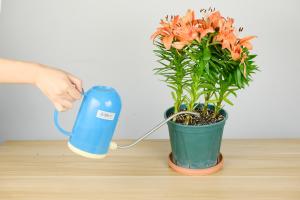Introduction: Should I Water Frozen Plants?
In regions where winter is severe, gardeners may be faced with the question of whether or not to water frozen plants. It is natural to be concerned about the survival of plants in freezing temperatures, especially when they seem to be thawing out during a sudden warm spell. However, before you reach for the watering can, it is crucial to understand how plants react to extreme weather conditions.
Understanding Frozen Plants
Plants that have been exposed to frost or freezing temperatures may appear dry and brittle. This is because ice crystals have formed within their cells, causing the walls to rupture. As a result, the plant may show signs of damage, such as leaf drop or discoloration. In severe cases, the plant may die back entirely.
When to Water Frozen Plants
In general, it is not recommended to water frozen plants. This is because watering frozen plants can cause further damage to the already weakened cells, making the plant more susceptible to disease and pest infestations. Additionally, the water may freeze on the leaves and branches, forming a layer of ice that can add to the weight and breakage of the plant.
However, there are some exceptions to this rule. If the plant is already showing signs of dehydration, such as wilted or curled leaves, you may want to water it lightly to provide some relief. Likewise, if the plant has been exposed to freezing temperatures for an extended period, it may be necessary to water it to help it recover once the weather warms up.
How to Water Frozen Plants
If you decide to water frozen plants, it is essential to do so with caution. Use a watering can with a gentle showerhead to avoid damaging the leaves and branches. Water only the roots and avoid pouring water on the leaves or branches. This will minimize the risk of the water freezing on the plant and causing further damage.
Preventing Frozen Plants
The best way to protect plants from freezing temperatures is to be proactive. Before the onset of winter, make sure to mulch around the base of the plants to keep the soil moist and insulated. Cover the plants with a frost cloth or blanket to minimize the exposure to the cold. Finally, choose cold-tolerant plants that can withstand the harsh winter climate in your area.
Conclusion
In conclusion, watering frozen plants is generally not recommended as it can cause more harm than good. However, in certain circumstances, light watering may be necessary to help the plant recover. Remember always to be cautious when watering frozen plants and follow the correct procedures to minimize damage. Ultimately, the best way to protect your plants from the effects of freezing temperatures is to take preventative measures before the onset of winter.

 how many times do yo...
how many times do yo... how many planted tre...
how many planted tre... how many pine trees ...
how many pine trees ... how many pecan trees...
how many pecan trees... how many plants comp...
how many plants comp... how many plants can ...
how many plants can ... how many plants and ...
how many plants and ... how many pepper plan...
how many pepper plan...





























